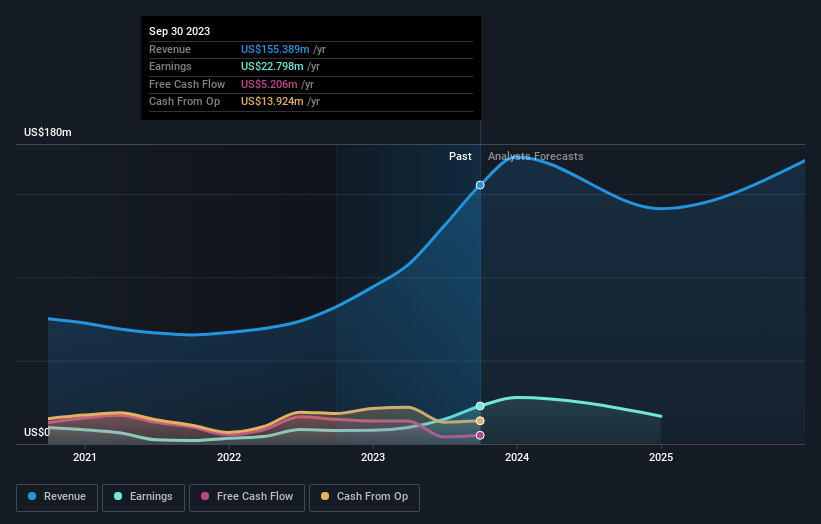Consolidated Water Co. Ltd. (NASDAQ:CWCO) is a favorite amongst institutional investors who own 56%
Key Insights
Significantly high institutional ownership implies Consolidated Water's stock price is sensitive to their trading actions
A total of 25 investors have a majority stake in the company with 49% ownership
Past performance of a company along with ownership data serve to give a strong idea about prospects for a business
If you want to know who really controls Consolidated Water Co. Ltd. (NASDAQ:CWCO), then you'll have to look at the makeup of its share registry. And the group that holds the biggest piece of the pie are institutions with 56% ownership. That is, the group stands to benefit the most if the stock rises (or lose the most if there is a downturn).
Since institutional have access to huge amounts of capital, their market moves tend to receive a lot of scrutiny by retail or individual investors. Therefore, a good portion of institutional money invested in the company is usually a huge vote of confidence on its future.
In the chart below, we zoom in on the different ownership groups of Consolidated Water.
Check out our latest analysis for Consolidated Water
What Does The Institutional Ownership Tell Us About Consolidated Water?
Many institutions measure their performance against an index that approximates the local market. So they usually pay more attention to companies that are included in major indices.
We can see that Consolidated Water does have institutional investors; and they hold a good portion of the company's stock. This implies the analysts working for those institutions have looked at the stock and they like it. But just like anyone else, they could be wrong. It is not uncommon to see a big share price drop if two large institutional investors try to sell out of a stock at the same time. So it is worth checking the past earnings trajectory of Consolidated Water, (below). Of course, keep in mind that there are other factors to consider, too.
Investors should note that institutions actually own more than half the company, so they can collectively wield significant power. Consolidated Water is not owned by hedge funds. The company's largest shareholder is BlackRock, Inc., with ownership of 6.5%. For context, the second largest shareholder holds about 5.5% of the shares outstanding, followed by an ownership of 3.4% by the third-largest shareholder. In addition, we found that Frederick McTaggart, the CEO has 1.5% of the shares allocated to their name.
Our studies suggest that the top 25 shareholders collectively control less than half of the company's shares, meaning that the company's shares are widely disseminated and there is no dominant shareholder.
Researching institutional ownership is a good way to gauge and filter a stock's expected performance. The same can be achieved by studying analyst sentiments. There is some analyst coverage of the stock, but it could still become more well known, with time.
Insider Ownership Of Consolidated Water
The definition of company insiders can be subjective and does vary between jurisdictions. Our data reflects individual insiders, capturing board members at the very least. Management ultimately answers to the board. However, it is not uncommon for managers to be executive board members, especially if they are a founder or the CEO.
Insider ownership is positive when it signals leadership are thinking like the true owners of the company. However, high insider ownership can also give immense power to a small group within the company. This can be negative in some circumstances.
We can report that insiders do own shares in Consolidated Water Co. Ltd.. In their own names, insiders own US$31m worth of stock in the US$561m company. It is good to see some investment by insiders, but it might be worth checking if those insiders have been buying.
General Public Ownership
The general public, who are usually individual investors, hold a 39% stake in Consolidated Water. While this size of ownership may not be enough to sway a policy decision in their favour, they can still make a collective impact on company policies.
Next Steps:
It's always worth thinking about the different groups who own shares in a company. But to understand Consolidated Water better, we need to consider many other factors. Like risks, for instance. Every company has them, and we've spotted 2 warning signs for Consolidated Water (of which 1 is significant!) you should know about.
If you would prefer discover what analysts are predicting in terms of future growth, do not miss this free report on analyst forecasts.
NB: Figures in this article are calculated using data from the last twelve months, which refer to the 12-month period ending on the last date of the month the financial statement is dated. This may not be consistent with full year annual report figures.
Have feedback on this article? Concerned about the content? Get in touch with us directly. Alternatively, email editorial-team (at) simplywallst.com.
This article by Simply Wall St is general in nature. We provide commentary based on historical data and analyst forecasts only using an unbiased methodology and our articles are not intended to be financial advice. It does not constitute a recommendation to buy or sell any stock, and does not take account of your objectives, or your financial situation. We aim to bring you long-term focused analysis driven by fundamental data. Note that our analysis may not factor in the latest price-sensitive company announcements or qualitative material. Simply Wall St has no position in any stocks mentioned.


